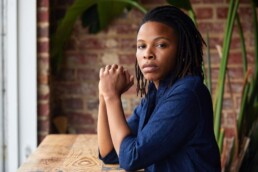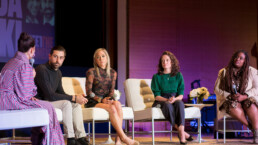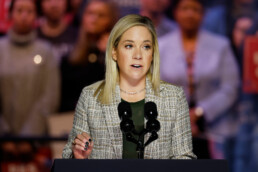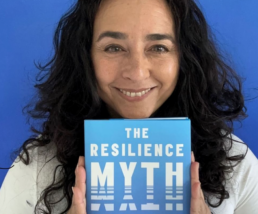That Abortion Pill Ruling
Hi Meteor readers,
This is my confession: the other night, I stayed up until 3:30 a.m. to witness NYC workers use two giant cranes to erect a $32 million, Italian-steel pedestrian bridge outside my apartment. Infrastructure, it’s amazing! It’s expensive! I really wish someone would fund my local library!

Anyway! Today we’ve got Rebecca Carroll in conversation with author Glynnis MacNicol on her new book. Plus: The Supreme Court rules unanimously that mifepristone access is safe—at least until the next villain comes along with a better argument.
Julianne Escobedo Shepherd

WHAT'S GOING ON
Mifepristone prevails! For now!: The Supreme Court, in a unanimous decision, dismissed a suit challenging access to mifepristone for medication abortion. Sixty-three percent of abortions are administered by medication, a number that increased after SCOTUS overturned Roe v. Wade. The ruling means that, for now, mifepristone is still accessible by mail everywhere (including in states where abortion is banned; it just carries legal risk there).
The suit, brought by the right-wing Alliance for Hippocratic Medicine and represented by attorney Erin Morrow Hawley—Sen. Josh “Jan. 6" Hawley's spouse—tried to argue that mifepristone shouldn't be accessible by mail, and that the FDA shouldn’t have ruled the drug safe for abortion because it put patients at risk, an assertion that is patently untrue. During oral arguments, SCOTUS expressed skepticism as to whether the plaintiffs had legal standing, and as expected, today’s opinions, written by Justices Kavanaugh and Thomas, speak to this. Which is to say, it’s a rare win, but one with an asterisk: Kavanaugh basically provided a roadmap for future suits, writing that because the plaintiffs “do not prescribe or use mifepristone, plaintiffs are unregulated parties who seek to challenge FDA's regulation of others." That’s basically an anti-abortion bat signal—he’s essentially asking for a suit from plaintiffs who do prescribe or use mifepristone.
But! There are a few cases in mifepristone’s favor currently weaving through the legal system: in Bryant v. Stein, a University of North Carolina doctor is suing that state for its restrictions on mifepristone, and GenBioPro Inc., v. Sorsaia is a similar suit in West Virginia. And in Washington et al v. FDA, the Attorneys General of 17 states plus the District of Columbia argue that the FDA has too many restrictions on mifepristone, challenging the rules that say the drug can only be provided by certified doctors and pharmacies. Controversial opinion: I agree and make it free.
AND:
- The Southern Baptist Convention is currently on its own little rampage to restrict everyone else’s bodies. While its vote Wednesday to ban women pastors from its churches failed, the convention voted to oppose IVF under the logic that frozen embryos are people—and also issued a guidance for Baptists to pressure the government to ban it, too. Even more disturbing was SBC seminary president Albert Mohler Jr.’s vile justification that IVF is the “alienation of reproduction in the conjugal setting,” and that LGBTQ people “exploit” IVF—which is to say, Al Mohler, a freak weirdo who also believes the earth is only 6000 years old and that doing yoga is anti-Christian, wants to keep queer people from being able to have children. In related news, young women are leaving the church in record numbers. Wonder if these things are connected, or?
- The U.S. Senate, for its part, is voting today on The Right to IVF Act, a Democrat-sponsored bill which would guarantee access to fertility treatments. It won’t pass, but—as with last week’s birth control debate— now we’ll know where our public servants stand.
- Hundreds of law enforcement officers have been caught sexually exploiting and abusing children whom they met on the job, according to a devastating, yearlong investigation by the Washington Post. Yet many of the perpetrators identified by the Post have gone scot free, with almost 40 percent avoiding prison time—and over half of those who were sentenced to prison receiving five years or less. A reminder here that police were never defunded—in fact, across America, police were funded even more.
- Rep. Ayanna Pressley said what we’re all thinking about Justice Alito.
- Bridgerton’s Penelope Featherington (played by Nicola Coughlan, our Irish queen) went full nude and gently lost her virginity, in what fans say is the best sex scene of the series. Shonda Rhimes does it again!
- In celebration of Father’s Day this weekend, we revisit a conversation from Free Future 2023 with beauty influencer Cyrus Veyssi who, together with their dad, is showing queer youth the possibility of a loving and accepting future.
https://vimeo.com/870324938/184fbfa78f?share=copy

OUR PLEASURE DOES NOT BELONG TO THE PATRIARCHY
BY REBECCA CARROLL
Author Glynnis MacNicol rejects the idea that feeling good is a frivolous pursuit

I recently decided that I’ve aged out of doing anything that doesn’t bring me some kind of pleasure, so Glynnis MacNicol’s new memoir, I’m Mostly Here to Enjoy Myself: A Woman’s Pursuit of Pleasure in Paris, might as well have been written for me, and me alone. MacNicol is single, and has written (and defended herself) extensively about this fact throughout her career (it was the subject of her first memoir, No One Tells You This). But even if you’re not single, there is something so immediately relatable, and deeply satisfying, about a woman choosing to feel good on her own terms. MacNicol, who is now 49, does that and then some with I’m Mostly Here to Enjoy Myself, which reads like an exquisitely unsupervised joyride through a sex-filled summer, with gooey cheese and good girlfriends set against the backdrop of a Parisian sky.
Rebecca Carroll: If you Google the word pleasure, which I did, the framework is invariably related to eroticism, sex, indulgence, and guilt. Beyond the patriarchy, why do you think that continues to be the narrow framework for pleasure?
Glynnis MacNicol: What I was trying to capture in this book is that the sources of pleasure for me at this age are so varied. My friendships bring me enormous pleasure. Sometimes, I think my bike is the love of my life—the movement and agency, and the idea I can get myself somewhere is pleasure. The idea of supporting myself as a writer brings me enormous pleasure. I don’t know how you can separate [any of] it from the patriarchy, though. Sarah Schulman wrote a piece in The New Republic after Roe was overturned, where she said that men have been determining the representation of women in story and structure for so long that women have internalized it to the point where we don’t understand our story outside of it—we don’t have any language around [our own representation] as being worthy of access. Even understanding that the sex in this book, and there is plenty of sex in this book, is what will likely end up selling it [to a broader audience], is connected to the patriarchy. Because when men think about women’s pleasure, they think, “Oh, she’s naked and having sex.”
I have to ask, because we are in this era of Ozempic—there’s this strange, oxymoronic thing about it, which is that here is a medication that will shut down your desire to eat, so that you can arrive at a place where your body is worthy of pleasure. What are your thoughts?
Wild, right? But whose pleasure is it now worthy of? Not your own. This book was written before the Ozempic era, and so there was none of that framework in terms of this medication that is [maybe] about restricting pleasure. I do feel like the way [Ozempic] is being used is reflective of how well-trained we are to think of our bodies as a source of pleasure for other people, and not for ourselves. But I recognize that there are very real health concerns at play. And I have not moved around the world in a fat body—I don’t experience the bias that comes with that. And I recognize the power of the pleasure you could experience by having a world that, even if you disagree with its value system, finds you valuable if you’ve only ever been punished by it.
What do you feel like you learned about pleasure through writing this book that you didn't know before?
That it’s serious. That it’s not a frivolous pursuit. If we want to talk about rethinking power structures, pleasure is as valuable a place to start as anywhere. The degree to which capitalism is based on [women] feeling like there’s something wrong with [us] that needs fixing is enormous. And in this moment, where women are losing access to abortion care, the move to rescind no-fault divorce laws portends to a future where women have less ability to control their own finances and ability to move freely, what begins to consume us is shrinking our bodies. And so a woman enjoying her own body feels very dangerous. There’s a fearlessness and a sense of power that comes in the ability to take pleasure in yourself.

Rebecca Carroll is a writer, cultural critic, and podcast creator/host. Her writing has been published widely, and she is the author of several books, including her recent memoir, Surviving the White Gaze. Rebecca is Editor at Large for The Meteor.

WEEKEND READING 📚
- On obsession: Do you know or have kids who cannot even talk yet, but are obsessed with the psychedelic babyscape that is CocoMelon? Jia Tolentino went down the neon rabbit hole. (The New Yorker)
- On sanctuary: Aude Konan wrote about the hope for Côte d’Ivoire as a safe haven for LGBTQIA+ people in West Africa. (Africa is a Country)
- On creativity: If you, too, are obsessed with the work of Julio Torres, don’t miss Cat Cardenas’s profile (or Torres's kaleidoscopic new TV show, Fantasmas). (De Los)

"There Is No Triage"
 June 11, 2024 Evening, Meteor readers, Today could be the last time you hear from me. Somewhat kidding! But I am signing off for the rest of the week to go camping and put that whole “bear versus man” thing to the test in the wilds of New Jersey. Turns out my midlife crisis hobby is just Outdoors.  In today’s newsletter, we look at Gaza’s decimated healthcare system. Plus, Justice Alito says the quiet part out loud—into a tape recorder. 🐻🐻🐻, Shannon Melero  WHAT'S GOING ONGaza hospitals in crisis: Over the weekend, when the IDF massacred 274 Palestinians in Nuseirat refugee camp while extracting four Israeli hostages, the situation at Al-Aqsa Martyrs Hospital—one of the last remaining hospitals still operating in Gaza—became exponentially worse with “hundreds” of patients and doctors pushed to the brink due to a lack of supplies and fuel to run generators. “Even the gloves we need for operations are missing,” Ali Abu Qorma, a surgeon, told The Daily Beast. (Multiple ceasefire deals that would have released the hostages peacefully have been rejected, most recently by Israel on May 7, but the U.S. is hoping the country will accept a proposal just passed by the UN Security Council, which Hamas has already verbally accepted.) The conditions at Al-Aqsa particularly concern public health experts, since 84 percent of all medical facilities in Gaza have been damaged or leveled by Israel's ongoing bombardment. Images coming out of the hospital are similar to those across Gaza: burned and bleeding patients, mostly children, lying on the floor in over-capacity medical wards where hundreds of refugees were already taking shelter. In a voice note sent to Doctors Without Borders, Karin Huster, a medical coordinator working in the hospital, said, “It's just one of those moments when you don't think about the chaos that is happening. There is no system, there is no triage. You roll up your sleeves, you put a ton of stuff in your pockets, and you do the best you can…But there is nothing, nothing at all, that justifies what I saw today. Nothing.” And as is almost always the case in conflict zones, the conditions across Gaza are even worse for women and girls, according to Dr. Natalia Kanem, executive director of the UN Population Fund. “We are facing a situation where women are delivering babies by cesarean section without anesthesia because there’s no energy, there’s no generator, the medicines are running out,” she told Al-Jazeera. Meanwhile, the UN's World Food Program has paused its aid shipments in Central Gaza after the IDF “rocketed” two of its warehouses in Nuseirat. Cindy McCain, executive director of WFP, told The Washington Post that the IDF’s actions “have made things a lot more dangerous.” (The Palestinian Red Crescent has also said that soldiers entered Nuseirat while hiding inside humanitarian aid trucks, which the IDF denies.) In March, an IPC report estimated that 1.1 million Gazans were struggling with catastrophic hunger; by July, the entire population could be experiencing full-blown famine. To help, you can donate to the Palestinian Red Crescent Society here and Doctors Without Borders here. The Palestine Children’s Relief Fund focuses on humanitarian aid to children in particular, and you can donate here. AND:
 NAME A MORE ICONIC JODIE. I'LL WAIT. (PHOTO BY NOEMÍ GONZALEZ)
 SOME OF THE "CONTESTANTS" OF THE FIRST EVER MISS AI BEAUTY PAGEANT. I'M SENSING A THEME HERE. (SCREENSHOT VIA WORLD AI CREATOR AWARDS)  FOLLOW THE METEOR Thank you for reading The Meteor! Got this from a friend?
|
![]()
SCOTUS Girl Summer
It’s going to be a big month of Supreme decisions. Here’s what to expect.
BY JULIANNE ESCOBEDO SHEPHERD
As Earth barrels into what looks to be another record-setting hot summer, certain U.S. Supreme Court Justices will be presumably enjoying the July-October recess at their beach houses, on luxury yachts, in a pile of dollar bills, and the like. But before the court breaks in about a month, it will be handing down decisions on abortion access, gun laws, social media, and more. So what we're saying is, bust out the fans, sunscreen, and comfortable marching shoes, because it might be another scorching SCOTUS girl summer in these streets.
Let’s take a look at a few of the most important rulings that will come down from SCOTUS—and one that already has.
THE RACIAL GERRYMANDERING CASE
Remember this when Republicans post MLK Jr. quotes on social media.
Here’s a decision we don’t have to guess about: The court has already handed down one discriminatory, landscape-altering decision in the form of Alexander v. South Carolina NAACP, or the racial gerrymandering case, in which SCOTUS approved a South Carolina voting map that shut out a large portion of the Black population from its district—basically stripping away Black South Carolinians' voting power. (For a great history of gerrymandering, a wonky word that obscures how much real damage it does to everything from abortion rights to racial justice—The Meteor's SOL has a terrific explainer for you.)
The decision makes it much easier for any state to redraw voting maps based on racial lines. Not only do these maps benefit white voters above everyone else (and Republicans, since Black voters are more likely to vote Democrat), they are part of a larger effort by extremists to undo voting rights gains made during the Civil Rights Movement. That effort includes big, sweeping devastations, like the gutting of the Voting Rights Act in 2013, and smaller, state-level tremors, such as the Kansas Supreme Court's anti-American ruling last week that voting isn't a fundamental right. This SCOTUS ruling didn’t get the press attention it deserved, but it’s a big, big deal.
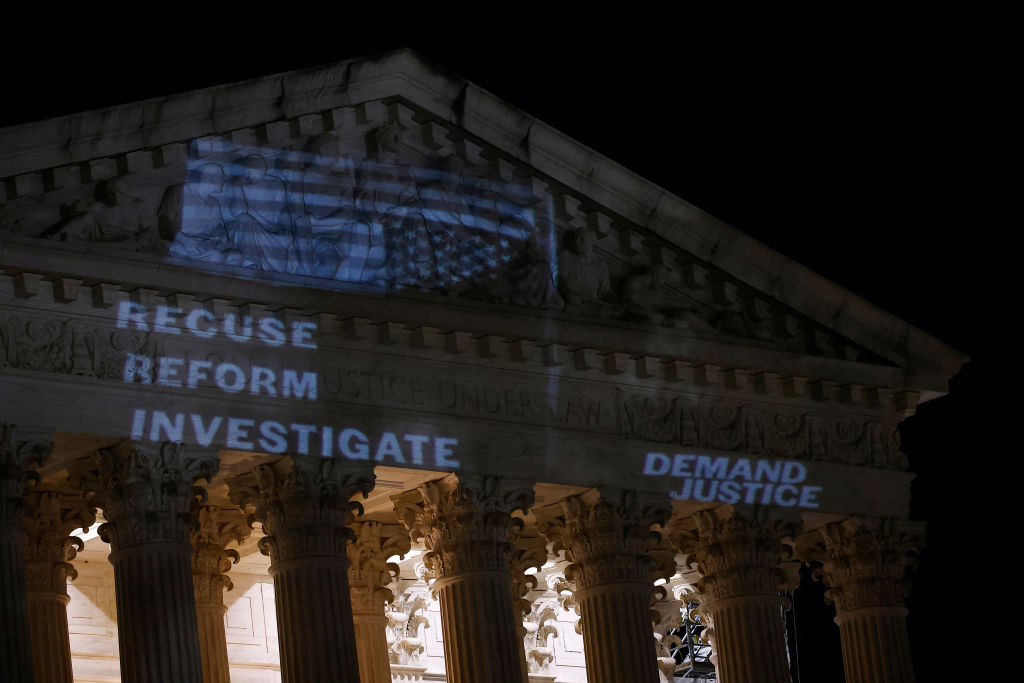
THE TWO ABORTION CASES
As if Dobbs wasn't enough!
Coming down shortly from SCOTUS: decisions in two cases that have to do with how—and whether—Americans should be allowed to access the basic medical procedure that is abortion. The first, FDA v. Alliance for Hippocratic Medicine, was brought by a group of anti-abortion doctors who charge that mifepristone, a progesterone blocker used in medication abortion, shouldn't be accessible by mail. (Here I must stop to observe the irony of a group of people who want to prevent patients from receiving care calling their practice “Hippocratic.” Also, Hippocrates doled out abortion recipes! But I digress.) The FDA approved mifepristone for abortion purposes in the year 2000 after rigorous testing; the Alliance is using junk science to falsely assert, decades later, that the drug puts patients at risk. Were SCOTUS to side with the Alliance, it would hamper abortion care for millions of women across the U.S.—medication is the most common method of abortion—not to mention kneecap the FDA's ability to approve any drug in the future. Fortunately, this case is expected to go in the favor of the FDA; during oral arguments, a majority of the justices seemed to think the Alliance didn't have the grounds.
In Idaho v. U.S., the potato state wants to be allowed to imprison doctors and other medical professionals who perform abortions, including in life-threatening cases, unless the pregnant person is literally on their deathbed. That extremist position is in violation of the Emergency Medical Treatment and Labor Act (EMTALA), which requires Medicare-funded hospitals to administer treatment to anyone who requires emergency care. (Forgot what EMTALA is, exactly? We’ve got another explainer.) The U.S. sued Idaho shortly before its law took effect, and now here we are, begging nine unelected officials to let people live their lives. (Or, as the ACLU put it, “Supreme Court to decide whether politicians can deny emergency care to pregnant people.”) The conservative justices were hard to read during oral arguments, but The Nation's Elie Mystal thinks it's not looking good for U.S. (and us).
THE DOMESTIC ABUSERS WITH GUNS CASE
Seems like they shouldn’t have them? But I’m just one lady with a brain.
In 2019, a 23-year-old Texas man named Zackey Rahimi was seen dragging the mother of his child across a parking lot, banging her head on the dash as he threw her into his car. When he realized there was a witness, Rahimi fired a gun at that person—resulting in a civil protective order that barred him from owning a gun and a restraining order to protect his former partner. Then after he was arrested for violating the restraining order, using a gun to threaten yet another woman, and shooting a gun five separate times in unrelated incidents, the state banned him from having guns under a statute that says, logically, that domestic abuse suspects should not have guns.
But after SCOTUS overturned a New York gun law that required a license to carry a concealed weapon, Rahimi sued and claimed that the domestic abuse law preventing him from having a gun is unconstitutional. (*silent scream*) And now gun stans are hoping that the court will loosen the country's extremely loose gun requirements even further. “If we’re just going to go back to the time in which the Second Amendment was written, that’s terrifying," Krista del Gallo, legislative director for the Texas Council on Family Violence, told the Texas Tribune. "It’s also—I’ll use this term—offensive. It’s offensive to women and children, who were the property of their husbands at the time; it’s offensive to Black people, [who] were not fully citizens at the time. There’s just so much there.”
THE UNHOUSED-PEOPLE CAMPING CASE
Is public land too public?
Another case coming down the pike goes after some of the most vulnerable among us: Grants Pass v. Johnson is a case in which the small city of Grants Pass, Oregon, wants to continue to arrest and fine unhoused people for sleeping outside. (Maybe this country should invest in housing for all?) The Ninth Circuit affirmed that doing so constituted “cruel and unusual punishment” in violation of the Eighth Amendment's imprisonment regulations, but the city continues to argue otherwise. Now we're about to see yet another test of this court's capacity for compassion with a ruling that will affect the unhoused in every state in America.
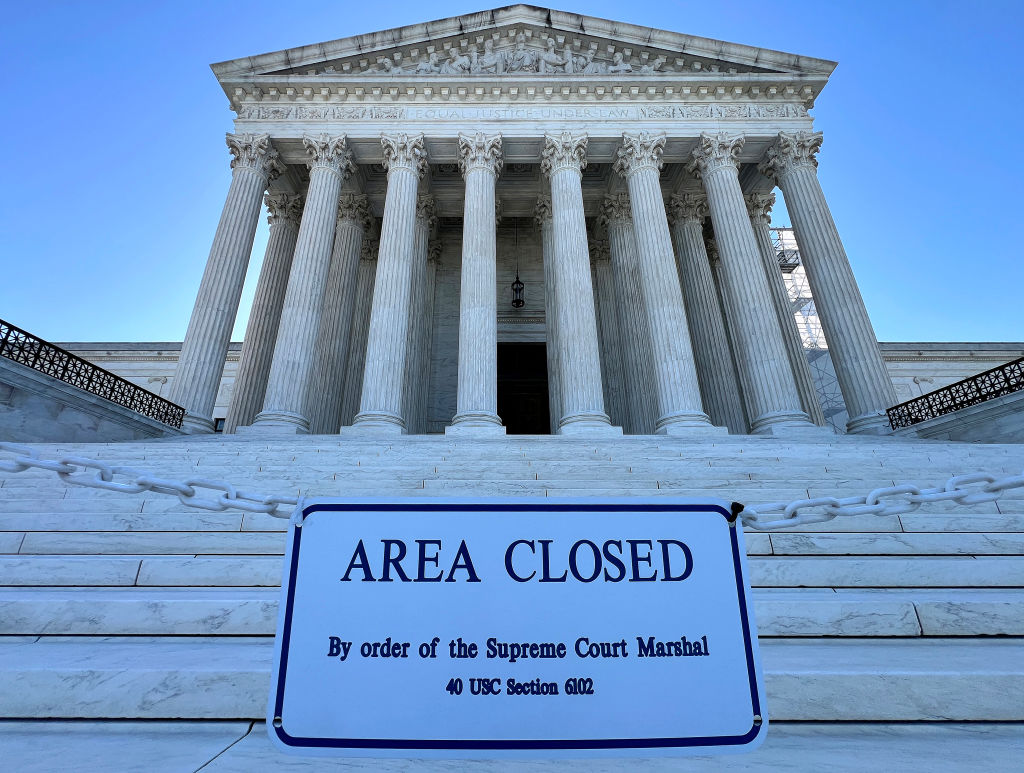
OH—DID YOU THINK WE FORGOT ABOUT JANUARY 6?
In addition to the aforementioned nail-biters, there are also a few cases that go to the heart of what our democracy even is—and what it might become. They raise questions like:
- Can a former president be prosecuted for, say, trying to overturn the results of a democratic election? Or can he be charged for obstructing the certification of those results? We’ll discover those answers in the cases of Trump v. United States and Fischer v. U.S.
- Can a presidential administration ask social media companies to stop spreading misinformation about, say, unprecedented health crises? You'd think this is a gimme, but the Republican Attorneys General who filed Murthy v. Missouri say no!
- SCOTUS will also need to answer the existential question of whether or not the federal government should do, like, anything? Some people (Relentless, Inc. v. Dept. of Commerce, Loper Bright Enterprises v. Raimondo) are wondering.
If all of this happens to rile you up, there are steps you can take that don't involve magically animorphing into President Biden and pushing Congress to expand the courts. (But wouldn't it be nice?)
- Demand Justice, which recently projected an upside-down flag on the Supreme Court building in a sly protest of Alito's (wife's) (allegedly) own upside-down flag, has a number of ways to get involved with their movement, including donating and joining their rapid response team.
- If you happen to be an attorney or law student—or even if you don't—you can join the Peoples' Parity Project, which has many chapters at colleges and in cities across the country. (You can also donate or pick up some pretty cool merch.)
- Fix the Court could use your donation, too, for their big ideas and a roster of several, small but mighty ways SCOTUS could become, in Peoples' Parity Project's words, "unfucked."
See you out there. 🌞

Julianne Escobedo Shepherd is a writer, culture critic, and editor in NYC. Her first book, Vaquera, about growing up in Wyoming and the myth of the American West, is forthcoming for Penguin.
Can the GOP Identify an IUD?
 June 6, 2024 Evening, Meteor readers, We’re approaching the most important event of the New York City social scene this weekend. I am obviously talking about the Puerto Rican Day parade. *horns blast in the background* *Marc Anthony begins to sing softly* For anyone wondering why a parade like this still matters, I remind you that it was once illegal to display the Puerto Rican flag in Puerto Rico, and to this day, the island exists under a smothering blanket of colonialism.  In today’s newsletter, Rebecca Carroll speaks with author Prentis Hemphill four years after the uprisings of summer 2020. Also: the new attacks on birth control, and your weekend reading list. Shannon Melero  WHAT'S GOING ONControlling birth control: Perhaps you were wondering why there was a 20-foot inflatable IUD in Washington, D.C. yesterday? It wasn’t feminist performance art (at least, not in the explicit sense); the IUD was erected by Americans for Contraception, a nonpartisan advocacy group, to bring attention to the Right to Contraception Act, which Democrats took to the Senate floor yesterday—and which Republicans blocked from consideration. (Sen. Chuck Schumer was the sole Democrat to vote no, but purely for procedure, so he can re-introduce the bill.) This was all part of the plan: Dems knew that Republicans would filibuster a bill that guarantees access to contraception and introduced it to make a point in an election year. (The House passed it in 2022.) As Sen. Maizie Hirono, one of the bill’s sponsors, put it after the vote: “Once again, Republicans have shown they’re more interested in controlling women’s bodies than protecting our freedoms.” Republicans have also shown that they love to lie, with Sen. Rick Scott and 21 of his extremist colleagues stating that the bill would force churches and elementary schools to hand out condoms. That's absurd (it unequivocally doesn't), but so is claiming that IUDs are a form of abortion—which is what Christina Francis, a Republican-affiliated, anti-abortion gynecologist, told Sen. Patty Murray on Wednesday in a hearing about the bans. (Asked point-blank whether she believes IUDs and the morning-after pill Plan B are abortifacients, Dr. Francis responded that she does. In truth, both work to prevent pregnancy.) This is all part of the right-wing agenda to demonize contraception overall, including the evangelical right's ongoing disinformation campaign against The Pill. Meanwhile, Republican senators continue to insist that they really, truly, pinky-swear don’t want to touch the right to contraception: Josh "Jan. 6" Hawley scoffed at the bill, telling NBC, “Nobody's going to overturn Griswold. No way”—a reference to the Supreme Court decision protecting contraceptive use. (He also went on to claim, erroneously, that the bill’s passage would make the abortion pill mifepristone “available in all 50 states no matter what the law is.”) But given the court’s current makeup, enshrining protections for the rights we most take for granted is crucial: “We are kidding ourselves,” Sen. Schumer said on the floor, “if we think the hard-right is satisfied with simply overturning Roe.” A vote on the IVF bill is next. AND:
 WE LIKE THIS NEWSLETTER, TOOFrom our friends at Capital B: “There’s more going on in Black communities than what usually makes the news. Capital B is your guide to fresh perspectives and a deeper understanding of the big issues impacting the culture from coast to coast. In our weekly national newsletter, delivered every Saturday, our reporters share insights into a major story, and help you stay up to date on the news you won’t find in Big Media. Sign up for the newsletter today!”  ABOUT THAT “RECKONING”“What We Do in the Streets Is a Way of Grieving”BY REBECCA CARROLL On the fourth anniversary of the Black Lives Matter uprisings, author Prentis Hemphill offers a new way of looking at things, and what's next VIA PRENTISHEMPHILL.COM Four years after George Floyd’s murder, I realized that I simply do not have it in me to write another piece about Black pain, patterns and cycles of violent racism, and the endless trauma that continues to course through our bodies and bloodlines. I’ve literally written hundreds of them. I’m tired. And it feels like nothing ever changes. But years ago, I asked the late civil rights activist Julian Bond how he managed to stay hopeful in the face of what often feels like little progress. He said, “There are enough victories to keep hope alive, and that’s what activism is.” And so I keep looking for the victories, which lately has meant having conversations with folks, particularly younger folks, who are deep in the work with fresh eyes, bright minds, and open hearts. Prentis Hemphill is one of those folks, one who, right on time, has a new book out called What it Takes to Heal: How Transforming Ourselves Can Change the World. The author, therapist, and organizer spoke with me about the power of collective grief, finding the small openings of possibility, and the necessity of visual longing. Rebecca Carroll: Your book begins, “When Trayvon Martin was killed, I had just started working at a community mental health clinic in Los Angeles, one of three Black therapists on a staff of nearly fifty.” How do you hold the grace to write about the fact of yet another Black body being killed? Prentis Hemphill: The only way is by being in community that can feel, and grieve, and strategize, and celebrate. That’s the only thing that actually sustains me. I can only face things because I’m held, and because I’m also holding. Every time someone in our community is killed in this way, it reverberates. We have memories of people in our communities that were killed that way, people in our families that were killed that way. The ongoing violence against Black people, it reverberates through all of our grief and all of our pain. Even though we as a people have made it this far because we reach for each other, I think we also try to—and have to—shoulder more than is ours to bear. I was just having a conversation with a dear friend and organizer, Malkia Devich-Cyril, about how our grief has been criminalized and that part of what we do in the streets is a way of grieving. But because of what is projected onto us as Black people, our actions are never read as grief rituals; they are often labeled as violent, disruptive, inconvenient. By “what we do in the streets,” I take that to mean being collectively loud, actively creating movement culture, and just being Black—does it matter whether we know that we are simultaneously grieving?  BLACK LIVES MATTER PROTESTORS TAKING TO THE STREETS OF NEW YORK CITY, JUNE 2020. (VIA GETTY IMAGES) That’s a great question. Having been at a lot of protests and on the ground in so many different places over the last 15 years, I think a lot of people know that their grief is present. But there’s the connective piece—the collectivizing of the experience of “I feel this pain”—that we don’t talk about. We know it’s our grief, but we also narrow it, because that’s what we’ve had to do to get by. I am interested in starting to unlock how [our grief] can be bigger, because that’s the truth of what we’re holding.
 WEEKEND READING 📚On strange bedfellows: Would it surprise you to learn that Planned Parenthood’s cybersecurity is managed by Raytheon? Just like all relationships, it’s complicated. (Prism) On talking to the dead: AI is creeping its ways into all facets of everyday life. But a new AI company, Eternos, wants to make it part of death, too. (Fast Company) On bad takes: The good news? Everyone is talking about women’s basketball. The bad news? Everyone is talking about women’s basketball. (The Atlantic)  FOLLOW THE METEOR Thank you for reading The Meteor! Got this from a friend?
|
![]()
“What We Do in the Streets Is a Way of Grieving”
June 6, 2024NEWS,FEATURED STORY
On the fourth anniversary of the Black Lives Matter uprisings, author Prentis Hemphill offers a new way of looking at things, and what's next.
BY REBECCA CARROLL
Four years after George Floyd’s murder, I realized that I simply do not have it in me to write another piece about Black pain, patterns and cycles of violent racism, and the endless trauma that continues to course through our bodies and bloodlines. I’ve literally written hundreds of them. I’m tired. And it feels like nothing ever changes.
But years ago, I asked the late civil rights activist Julian Bond how he managed to stay hopeful in the face of what often feels like little progress. He said, “There are enough victories to keep hope alive, and that’s what activism is.” And so I keep looking for the victories, which lately has meant having conversations with folks, particularly younger folks, who are deep in the work with fresh eyes, bright minds, and open hearts. Prentis Hemphill is one of those folks, one who, right on time, has a new book out called What it Takes to Heal: How Transforming Ourselves Can Change the World. The author, therapist, and organizer spoke with me about the power of collective grief, finding the small openings of possibility, and the necessity of visual longing.
Rebecca Carroll: Your book begins, “When Trayvon Martin was killed, I had just started working at a community mental health clinic in Los Angeles, one of three Black therapists on a staff of nearly fifty.” How do you hold the grace to write about the fact of yet another Black body being killed?
Prentis Hemphill: The only way is by being in community that can feel, and grieve, and strategize, and celebrate. That’s the only thing that actually sustains me. I can only face things because I’m held, and because I’m also holding. Every time someone in our community is killed in this way, it reverberates. We have memories of people in our communities that were killed that way, people in our families that were killed that way. The ongoing violence against Black people, it reverberates through all of our grief and all of our pain. Even though we as a people have made it this far because we reach for each other, I think we also try to—and have to—shoulder more than is ours to bear.
I was just having a conversation with a dear friend and organizer, Malkia Devich-Cyril, about how our grief has been criminalized and that part of what we do in the streets is a way of grieving. But because of what is projected onto us as Black people, our actions are never read as grief rituals; they are often labeled as violent, disruptive, inconvenient.
By “what we do in the streets,” I take that to mean being collectively loud, actively creating movement culture, and just being Black—does it matter whether we know that we are simultaneously grieving?
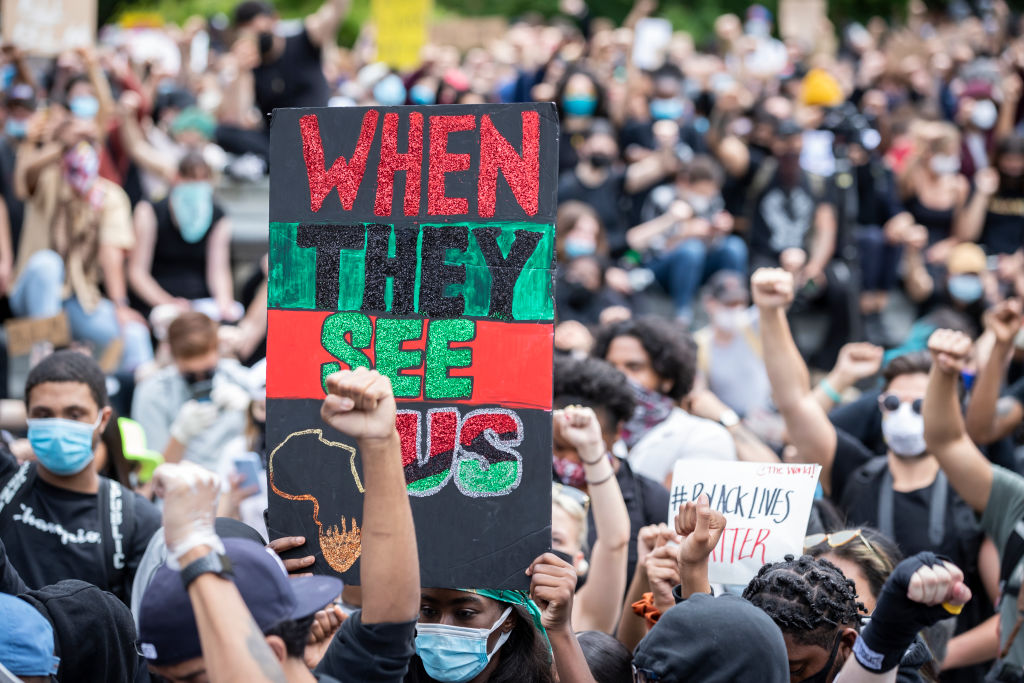
That’s a great question. Having been at a lot of protests and on the ground in so many different places over the last 15 years, I think a lot of people know that their grief is present. But there’s the connective piece—the collectivizing of the experience of “I feel this pain”—that we don’t talk about. We know it’s our grief, but we also narrow it, because that’s what we’ve had to do to get by. I am interested in starting to unlock how [our grief] can be bigger, because that’s the truth of what we’re holding.
You wrote about not being able to know how Harriet Tubman learned to trust her dreams. How did you learn to trust your dreams?
I always felt entitled to my life, to an authentic life. I always felt like, if God made me, then I’m all right. I can see the way that human beings create rankings and structures to take you away from the truth of it all, but there was always something in me that wasn’t confused. I would like to say I was just born with that, but I can feel my grandmother in it, I can feel my great-grandmother in it—[this notion] that the world is telling one story, and I feel something truer. I think it means a lonely path for a lot of people who refuse to dim their light. Sometimes, we have to dim our lights for the sake of safety, but for the most part, I cultivate that light in me. I think life wants to express itself.
There’s this one really striking line from the book: “It’s hard to heal when you're still being hurt.” How do we lead our way through healing while we’re still being hurt in all ways?
When we get hurt or experience trauma, when we don’t have space to process it, some part of us gets locked in that moment, and we’re replaying and responding to it all the time. When I work with people, [what makes a difference is] the recognition that in each moment, there is a choice. It may not be an ideal choice, but when our stories hold us captive, we’re no longer able to perceive the choices in this moment. It’s the work of finding the very small openings where something else might be possible. That’s a part of healing. That’s what Harriet Tubman was able to do. She was like, “You have me in this world, but now, I can see that there’s a little opening here. I can see a friend here. I can see a path here.”
It feels like we’re talking about trauma on a national level in ways that we haven’t before—what do you think is on the other side of that conversation?
I’m curious about trauma as a human phenomenon—and knowing this, how then do we structure our societies, our communities? What would we do if we knew that healing was important? I bet we would construct the world in a different way, and it wouldn’t be based as much on exploitative and violent tendencies which we’ve normalized at this point. I’d rather we normalize something else.
In the book, you wrote that visions are rooted in longing—can you say more about that?
I’m not a real churchy person, but “faith without works is dead” is something my grandmother would say all the time. We get sold visions for our lives, sold visions for who we are supposed to be. It’s necessary for us to reactivate that kind of looking around that, again, Harriet Tubman was able to do—looking through the cracks, looking underneath, and activating our own strangeness. No matter what happens tomorrow, we are facing compounding, complex crises. I hope that [my book] is a tool, something that accompanies people through the changes and challenges I think we're all facing.
My name is Prentis, which means student. I feel like my role is to tenderly offer the questions that I feel need to be posed in this moment. I don’t position myself as an authority. I position myself as someone who is learning, someone whose role in community is to pose questions—and to keep us close as we try to answer them.
"They Don't Look at Us as Human Beings"
June 4, 2024NEWS,FEATURED STORY
Lead plaintiff Amanda Zurawski on the Texas Supreme Court’s decision to uphold a ban that almost killed her—and why she’s planning to run for office herself
BY CINDI LEIVE
We’ve grown accustomed to courts acting coldly, but last Friday’s Texas Supreme Court decision seemed especially and brutally devoid of compassion. In Zurawski v. State of Texas, the court had heard from 20 women who had been denied abortion care when experiencing pregnancy complications—women who had hemorrhaged, been forced to carry babies without skulls, and nearly died. And yet, the justices still ruled not to change or amend Texas’s abortion ban, which has forced doctors to deny patients vital medical care out of fear of prosecution. (What this says about the state’s regard for the vastly greater number of people who need abortions for less “medically necessary” reasons—such as, you know, not wanting to be pregnant anymore—is a story for another time.)
Over the weekend, I called Amanda Zurawski, the woman who lent her name—and the last year and a half of her life—to the lawsuit. I first met Amanda in the fall of 2022 when a doctor whispered to one of my Meteor colleagues that there was a woman in Austin who’d been through hell and might be willing to share her story. She did, detailing her harrowing experience for the world, but then went on to do much more, testifying before Congress, speaking up for other patients—and taking on her own state’s government.
Cindi Leive: This decision felt like a punch in the face to so many women—but for those of you who testified, and your families, it was so personal. What measure of justice were you and [your husband] Josh expecting? How much was this a surprise to you?
Amanda Zurawski: It wasn't a huge surprise because we know that the Texas Supreme Court is full of conservative Republicans—[all] nine of [the justices] are conservative Republicans. And then, after the ruling in the Kate Cox case [in which the court denied the December 2023 abortion request of a Texas woman whose fetus had no chance of survival], that was a signal of how our case was going to go. So we had time to prepare for a loss.
What we weren't expecting, and what we were really surprised by, was the way that they wrote the decision—that they literally wrote out most of the plaintiffs by not even using their name. [Only three patients and two doctors were referred to by name in the ruling.] And that felt unnecessarily cruel and offensive…To me, it means they don't care about us and they don't look at us as human beings. They don't care about our trauma, our grief, our loss. They don't want to acknowledge us. Because as long as they can ignore us and pretend like we don't exist—just like my Senators [Ted Cruz and John Cornyn] did when I testified in front of Congress—they can pretend like the problem isn't real.
We did a press call right after the ruling came out, and there were 11 plaintiffs that could join. And seeing their faces and hearing their voices and how heartbroken they were—that was really gutting.
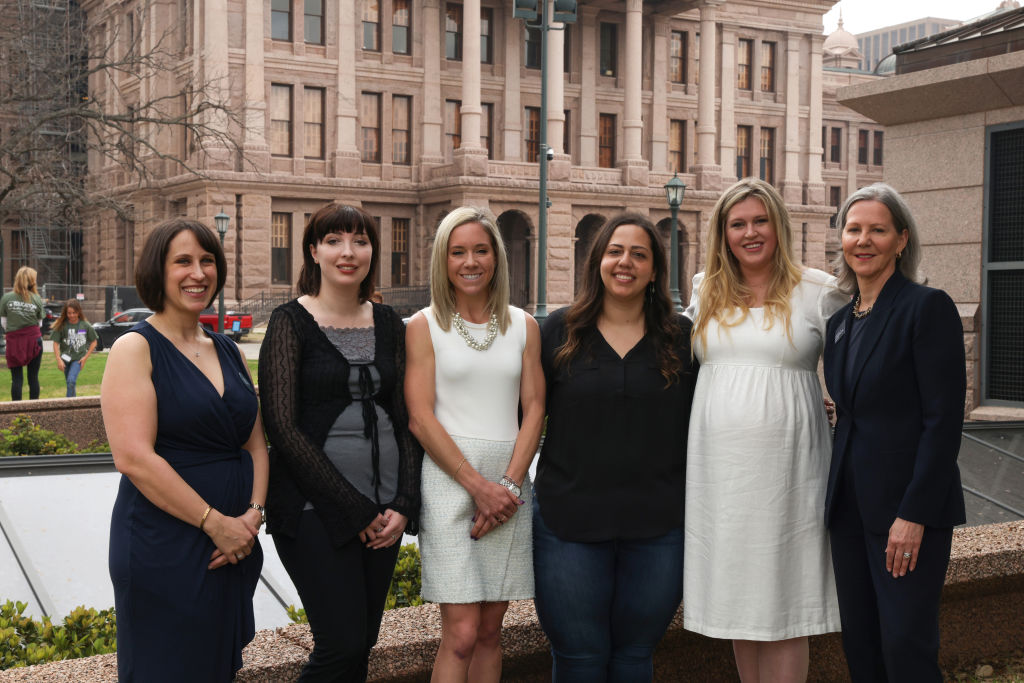
You said that that was the hardest part for you. Why?
I want to acknowledge my name was used in the Supreme Court's decision. They did acknowledge what happened to me personally, and they didn't for anyone else. And that feels very unfair and very unjust. And I also feel a little bit like…people were counting on me, I think, because I was the first one to file, because it was my name on the suit…I do feel a little bit like people were depending on me, and I feel a little bit like I let them down.
You said on Friday, “We will continue to fight.” Tell me how.
Well, I don't think our lawsuit can do much more. People keep asking me if it's going to go to the U.S. Supreme Court, and I want to make it very clear that…likely, this is the end. But we can keep fighting in other ways. Personally, I will continue to campaign to get people to vote for pro-choice candidates. We can continue to share our own stories and to share other people's stories. We can donate our time and our money to abortion providers and organizations.
And did you say that some of the Texas Supreme Court justices are up for reelection?
Yes! There are three up for reelection [Jimmy Blacklock, John Devine, and Jane Bland]. I think we know now very clearly how they feel about…a woman's right to choose, so I'm really hoping that we can get the word out before November and not get them reelected. It feels really good to be able to say that so clearly, because for a year and a half I couldn't, because we had an ongoing lawsuit. [Now] I'm like, let's light some fires.
I’ve been thinking about what’s happened in Texas since you first filed your lawsuit. You were the first [plaintiff], and then there were five women, and then 20. And I don't know if you saw this thread, but just two weeks ago, Ryan Hamilton, a musician and DJ, tweeted that his wife, who had been pregnant with their second child, was denied abortion care in a very similar situation to yours. Despite the baby no longer having a heartbeat, she was repeatedly sent home. She lost so much blood that he found her unconscious on the bathroom floor. She almost died. This happened in Texas two weeks ago. How does it feel knowing that while the Supreme Court is making this decision, claiming that doctors are able to do the right thing [under existing Texas law], the number of women who have been exactly where you were continues to climb?
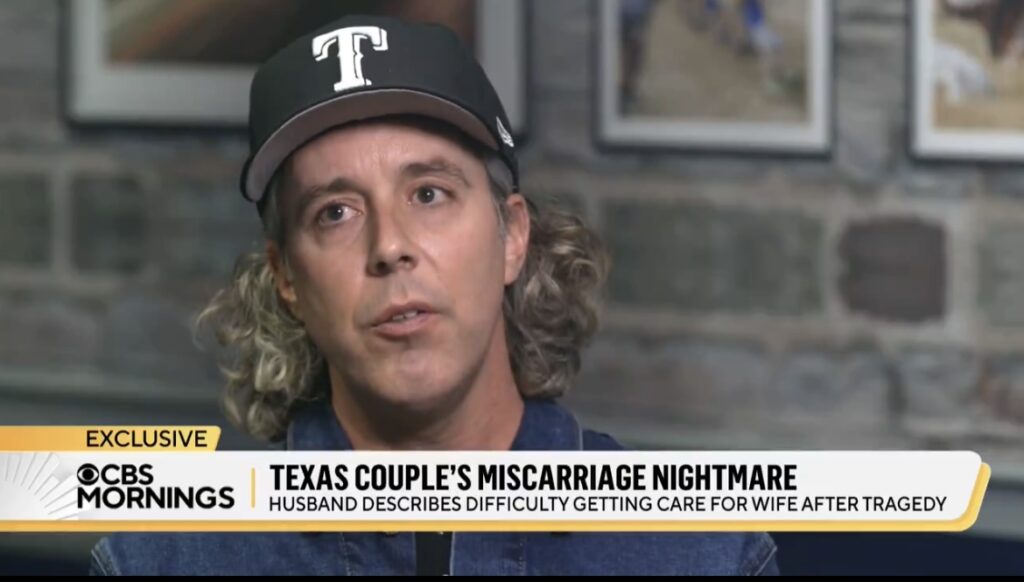
That story makes me sick to my stomach. And it's going to keep happening, because lawmakers aren't doing anything to fix it. It's infuriating that the Supreme Court of Texas had the opportunity to fix this—had the opportunity to make things better—and they did nothing. And when the Supreme Court says, “Doctors can practice medicine, this isn't a problem, the law is clear”—clearly that's not the case! Listen to our stories. Listen to what's happening to us. Listen to doctors. They refuse to hear us, and I don't know what it's going to take for them to wake up and realize that people are dying because of this. Or if they haven't yet, they're going to.
There's an enormous amount of suffering happening in Texas and similar states, and they need to fix it.
Three months ago, when the Alabama Supreme Court was deeming embryos people, you said that you worried that Texas was going to do the same, and that you were going to move your embryos out of state. The irony is incredible: You need IVF because the state's laws impacted your fertility, and now the state is making that path to having a family more difficult. How has that process felt?
It was pretty upsetting, because moving embryos is, as you can imagine, incredibly complicated. It is very expensive. And from my understanding, things don't go wrong very often, but if they do, it's catastrophic—you lose your embryos. As we [were] going through it, I'm like, this is terrifying, because I feel like we're on a ticking clock, because Texas [could] make this decision [to criminalize IVF] any day. By the way, there now is a case about embryonic personhood that the Texas Supreme Court is deciding whether or not to hear…[and] depending on how they rule, it could do the exact same thing that happened in Alabama and threaten IVF access. Fortunately, our [embryos] are now safe, but if Trump is reelected, we're scared that it won't matter where your embryos are, because he'll institute national bans or laws that are going to affect their safety. It's just a really troubling, scary time right now to be trying to plan a family.
Last question—what gives you hope right now? Is there anything?
You know, in our press call, my fellow plaintiff, Dr. Austin Dennard, said that she likes to think that people are good. And I agree with her. I think that most people at their core want to do the right thing. And when we're speaking out about what happened to us, we do see a lot of goodness in most people. And I see the people who are fighting in their communities. I see people who are running for office because they're trying to protect women. And I think there's a lot to be hopeful about. I do think we're going to fix this. It's going to take a lot of work, but we can do it.
You mentioned women running for office. I can't get off the phone without asking you the same question that America Ferrera asked you onstage at our event a year and a half ago. Any further thoughts about you running for office?
Oh, yeah… That is probably going to happen. I've started trying to figure out what office might be a good fit for me. I’ve talked to a lot of different organizations; I’ve talked to a lot of different individuals. I think the next step would be fundraising. But Zurawski ‘26 is probably something you’ll see.
Zurawski 2026. Amazing. We’ll leave it there.
The plaintiffs in the case are: Patients Amanda Zurawski, Lauren Miller, Lauren Hall, Anna Zargarian, Ashley Brandt, Kylie Beaton, Jessica Bernardo, Samantha Casiano, Austin Dennard, D.O., Taylor Edwards, Kiersten Hogan, Lauren Van Vleet, Elizabeth Weller, Kristen Anaya, Kaitlyn Kash, D. Aylen, Kimberly Manzano, Danielle Mathisen, M.D., Cristina Nuñez, and Amy Coronado; and health care providers Damla Karsan, M.D. and Judy Levison, M.D., M.P.H. Read their stories on Center for Reproductive Rights' site.
"Let's Light Some Fires"
 June 5, 2024 Hey hey hello, It's your girl, reporting to you from the wilds of perimenopause, which is supposedly cool now. That's easy to say when you're not on the receiving end of a hot flash (who installed this faulty radiator in my body?!), but I am very happy that at least these days, there is more reporting about the subject—including this op-ed published last week by Sadhvi Siddhali Shree and Alyssa Milano—as well as the beginning of government action. When I started looking into it a few years ago, all I found was, and this is a technical term, nada.  More importantly, in today's newsletter Cindi Leive speaks with Amanda Zurawski, the lead plaintiff in the suit against Texas's inhumane abortion policy, about her next steps now that the Texas Supreme Court has decided to uphold the ban. Spoiler: it was a devastating blow, but Zurawski has exciting plans to fight back. Plus, Simone Biles makes history (again), and OpenAI employees confirm that AI is kinda as bad as you think. Let's do this, Julianne Escobedo Shepherd  WHAT'S GOING ON
 THE GOOD FIGHT“They Don't Look at Us As Human Beings”BY CINDI LEIVE Lead plaintiff Amanda Zurawski on the Texas Supreme Court’s decision to uphold a ban that almost killed her—and why she’s planning to run for office herself "LET'S LIGHT SOME FIRES," SAYS AMANDA ZURAWSKI (VIA GETTY IMAGES) We’ve grown accustomed to courts acting coldly, but last Friday’s Texas Supreme Court decision seemed especially and brutally devoid of compassion. In Zurawski v. State of Texas, the court had heard from 20 women who had been denied abortion care when experiencing pregnancy complications—women who had hemorrhaged, been forced to carry babies without skulls, and nearly died. And yet, the justices still ruled not to change or amend Texas’s abortion ban, which has forced doctors to deny patients vital medical care out of fear of prosecution. (What this says about the state’s regard for the vastly greater number of people who need abortions for less “medically necessary” reasons—such as, you know, not wanting to be pregnant anymore—is a story for another time.) Over the weekend, I called Amanda Zurawski, the woman who lent her name—and the last year and a half of her life—to the lawsuit. I first met Amanda in the fall of 2022 when a doctor whispered to one of my Meteor colleagues that there was a woman in Austin who’d been through hell and might be willing to share her story. She did, detailing her harrowing experience for the world, but then went on to do much more, testifying before Congress, speaking up for other patients—and taking on her own state’s government. Cindi Leive: This decision felt like a punch in the face to so many women—but for those of you who testified, and your families, it was so personal. What measure of justice were you and [your husband] Josh expecting? How much was this a surprise to you? Amanda Zurawski: It wasn't a huge surprise because we know that the Texas Supreme Court is full of conservative Republicans—[all] nine of [the justices] are conservative Republicans. And then, after the ruling in the Kate Cox case [in which the court denied the December 2023 abortion request of a Texas woman whose fetus had no chance of survival], that was a signal of how our case was going to go. So we had time to prepare for a loss. What we weren't expecting, and what we were really surprised by, was the way that they wrote the decision—that they literally wrote out most of the plaintiffs by not even using their name. [Only three patients and two doctors were referred to by name in the ruling.] And that felt unnecessarily cruel and offensive…To me, it means they don't care about us and they don't look at us as human beings. They don't care about our trauma, our grief, our loss. They don't want to acknowledge us. Because as long as they can ignore us and pretend like we don't exist—just like my Senators [Ted Cruz and John Cornyn] did when I testified in front of Congress—they can pretend like the problem isn't real. We did a press call right after the ruling came out, and there were 11 plaintiffs that could join. And seeing their faces and hearing their voices and how heartbroken they were—that was really gutting.  AMANDA ZURAWSKI (CENTER IN WHITE) LAST MARCH WITH SOME OF HER FELLOW PLAINTIFFS AND LAWYERS FOR THE CASE (VIA GETTY IMAGES) You said that that was the hardest part for you. Why? I want to acknowledge my name was used in the Supreme Court’s decision. They did acknowledge what happened to me personally, and they didn’t for anyone else. And that feels very unfair and very unjust. And I also feel a little bit like…people were counting on me, I think, because I was the first one to file, because it was my name on the suit…I do feel a little bit like people were depending on me, and I feel a little bit like I let them down. You said on Friday, “We will continue to fight.” Tell me how. Well, I don’t think our lawsuit can do much more. People keep asking me if it’s going to go to the U.S. Supreme Court, and I want to make it very clear that…likely, this is the end. But we can keep fighting in other ways. Personally, I will continue to campaign to get people to vote for pro-choice candidates. We can continue to share our own stories and to share other people’s stories. We can donate our time and our money to abortion providers and organizations. And did you say that some of the Texas Supreme Court justices are up for reelection? Yes! There are three up for reelection [Jimmy Blacklock, John Devine, and Jane Bland]. I think we know now very clearly how they feel about…a woman’s right to choose, so I’m really hoping that we can get the word out before November and not get them reelected. It feels really good to be able to say that so clearly, because for a year and a half I couldn’t, because we had an ongoing lawsuit. [Now] I’m like, let’s light some fires. I’ve been thinking about what’s happened in Texas since you first filed your lawsuit. You were the first [plaintiff], and then there were five women, and then 20. And I don't know if you saw this thread, but just two weeks ago, Ryan Hamilton, a musician and DJ, tweeted that his wife, who had been pregnant with their second child, was denied abortion care in a very similar situation to yours. Despite the baby no longer having a heartbeat, she was repeatedly sent home. She lost so much blood that he found her unconscious on the bathroom floor. She almost died. This happened in Texas two weeks ago. How does it feel knowing that while the Supreme Court is making this decision, claiming that doctors are able to do the right thing [under existing Texas law], the number of women who have been exactly where you were continues to climb?  RYAN HAMILTON SHARING HIS WIFE'S HEARTBREAKING STORY. (SCREENSHOT VIA CBS NEWS) That story makes me sick to my stomach. And it's going to keep happening, because lawmakers aren't doing anything to fix it. It's infuriating that the Supreme Court of Texas had the opportunity to fix this—had the opportunity to make things better—and they did nothing. And when the Supreme Court says, “Doctors can practice medicine, this isn't a problem, the law is clear”—clearly that's not the case! Listen to our stories. Listen to what's happening to us. Listen to doctors. They refuse to hear us, and I don't know what it's going to take for them to wake up and realize that people are dying because of this. Or if they haven't yet, they're going to. There's an enormous amount of suffering happening in Texas and similar states, and they need to fix it. Three months ago, when the Alabama Supreme Court was deeming embryos people, you said that you worried that Texas was going to do the same, and that you were going to move your embryos out of state. The irony is incredible: You need IVF because the state's laws impacted your fertility, and now the state is making that path to having a family more difficult. How has that process felt? It was pretty upsetting, because moving embryos is, as you can imagine, incredibly complicated. It is very expensive. And from my understanding, things don't go wrong very often, but if they do, it's catastrophic—you lose your embryos. As we [were] going through it, I'm like, this is terrifying, because I feel like we're on a ticking clock, because Texas [could] make this decision [to criminalize IVF] any day. By the way, there now is a case about embryonic personhood that the Texas Supreme Court is deciding whether or not to hear…[and] depending on how they rule, it could do the exact same thing that happened in Alabama and threaten IVF access. Fortunately, our [embryos] are now safe, but if Trump is reelected, we're scared that it won't matter where your embryos are, because he'll institute national bans or laws that are going to affect their safety. It's just a really troubling, scary time right now to be trying to plan a family. Last question—what gives you hope right now? Is there anything? You know, in our press call, my fellow plaintiff, Dr. Austin Dennard, said that she likes to think that people are good. And I agree with her. I think that most people at their core want to do the right thing. And when we're speaking out about what happened to us, we do see a lot of goodness in most people. And I see the people who are fighting in their communities. I see people who are running for office because they're trying to protect women. And I think there's a lot to be hopeful about. I do think we're going to fix this. It's going to take a lot of work, but we can do it. You mentioned women running for office. I can't get off the phone without asking you the same question that America Ferrera asked you onstage at our event a year and a half ago. Any further thoughts about you running for office? Oh, yeah… That is probably going to happen. I've started trying to figure out what office might be a good fit for me. I’ve talked to a lot of different organizations; I’ve talked to a lot of different individuals. I think the next step would be fundraising. But Zurawski ‘26 is probably something you’ll see. Zurawski 2026. Amazing. We’ll leave it there. The plaintiffs in the case are: Patients Amanda Zurawski, Lauren Miller, Lauren Hall, Anna Zargarian, Ashley Brandt, Kylie Beaton, Jessica Bernardo, Samantha Casiano, Austin Dennard, D.O., Taylor Edwards, Kiersten Hogan, Lauren Van Vleet, Elizabeth Weller, Kristen Anaya, Kaitlyn Kash, D. Aylen, Kimberly Manzano, Danielle Mathisen, M.D., Cristina Nuñez, and Amy Coronado; and health care providers Damla Karsan, M.D. and Judy Levison, M.D., M.P.H. Read their stories on the Center for Reproductive Rights site.  Cindi Leive is the co-founder of The Meteor, the former editor-in-chief of Glamour and Self, and the author or producer of best-selling books including Together We Rise.
 THE METEOR IRLPhoenix friends! We'll be out in front of the Arizona State House on Saturday with all kinds of fantastic people like Deja Foxx, singer Lauren Jauregui, Busy Philipps, and more—advocating for bodily autonomy (in the state that resuscitated an 1864 law, no less). Come say hello!  FOLLOW THE METEOR Thank you for reading The Meteor! Got this from a friend?
|
![]()
Our First Felon President
|
And Mexico's first woman leader
 June 3, 2024 Hello and wow, Where were you when a New York jury found Donald Trump guilty of 34 felony counts of falsifying business records in the so-called Stormy Daniels hush-money case? I was relaxing on my couch, thinking about the Disaster Girl meme. Sentencing will occur July 11—four days before the Republican National Convention. Each count carries a penalty of up to four years in prison, though the presiding judge, Justice Juan M. Merchan, may instead choose to sentence Trump to probation, fines, or house arrest. In any case, Trump’s inevitable appeal is unlikely to be wrapped up before the 2024 election, but he’ll always be known as the U.S. president who became a convicted felon over using campaign funds to suppress a National Enquirer story to influence the 2016 election. We got the reality-show president we wanted, I guess! While we let all this sink in, today’s newsletter focuses on another consequential election—the one in Mexico, where citizens are likely to elect its first woman president. Plus, the hypocrisy of a Supreme Court Justice basically going “mah wife,” a really great song to get you through the hard times, and some of our favorite reads by AAPI authors for the final weekend reading list of AAPI Heritage month. Orange is his color, Julianne Escobedo Shepherd  WHAT'S GOING ONAn election referendum on femicide: This Saturday, Mexicans will head to the polls to elect a new president, with two women at the forefront: progressive former Mexico City mayor Claudia Sheinbaum and her opponent, currently behind her in the polls, conservative candidate Xóchitl Gálvan. Sheinbaum is considered the protegée of current president Andrés Manuel López Obrador and is part of the Morena party, which elevated him to power; she has run, in part, on uplifting citizens from poverty and increasing security through social welfare. And, in addition to the seemingly Sisyphean task of curbing cartel violence and combating widespread corruption, whoever is elected must address the epidemic of femicide in Mexico, where ten women on average are murdered every day by intimate partners or other family members. Despite their historic roles as women candidates in a country entrenched in machista culture, both Sheinbaum and Gálvan’s statements on combating femicide have been vague, and some Mexican feminists are concerned about their ability to make a substantive difference. One skeptical activist recently told Ms. that she sees Sheinbaum as disinterested in “working on a comprehensive solution to femicide or bringing justice to the families of victims. We don’t expect a profound change or any real progress on the cases.” Furthering fears are both women candidates’ fuzzy proposals on other important topics like abortion and LGBQTIA rights. In an excellent new report by The World, feminist lawyer Patricia Olamendi offered one solution: “Mexico has a unique opportunity for change with a female president. The most urgent issue to tackle by the next administration is the creation of a prosecutor’s office specializing in femicides to deliver justice.” Until the next president accomplishes at least that, the valiant feministas of Mexico will continue pushing for change in the streets. As one feminist from the radical Black Bloc told AFP, “If we have to burn everything, we burn everything.”  CLAUDIA SHEINBAUM STUMPING, GESTURING IN CDMX (VIA HECTOR VIVAS/GETTY IMAGES) AND:• Supreme Court Justice Samuel Alito has finally addressed the upside-down flag hanging outside his house on January 6, first trying to blame it on a neighborly beef which actually happened a month after the flag was up, then just shunting all the blame onto his wife, Martha-Ann Alito. “She makes her own decisions,” he said in a letter to Congress, “and I have always respected her right to do so.” Oh really?, a coven of women around the country whispered in witchy unison. • Rolling Stone’s Cheyenne Roundtree and Nancy Dillon have published a blockbuster investigation into Diddy’s history of physical and sexual abuse allegations, which reportedly dates at least back to his time as a student at Howard University in the late 1980s. With some truly awful details, the report gives us yet another chilling look at how an entire industry can know about one powerful man's allegedly abusive behavior for more than 30 years. As one source said of witnessing Diddy verbally abuse Cassie in public, “Why is nobody saying anything? Are they that scared of him?” • In April, a talented singer from Toronto named Jennarie shared some of “Never Been Small,” a song she wrote in response to fat-shaming and other abuse she’s experienced online. The message (and her gorgeous voice) went viral; today, the full song is available and I can’t stop listening to her tale of survival and self-acceptance. This is the kind of track you blast when you’re at your lowest to give yourself the energy to pull through. Her other music is also amazing! • Fortune reports that Hello Alice, a company that helps small business growth, has prevailed against a lawsuit over a grant it had been offering with Progressive to Black-owned commercial transportation businesses. The suit, brought by racist lizard Stephen Miller’s legal firm on behalf of a white male trucker alleging discrimination, was thrown out by an Ohio judge, who determined the trucker was unable to prove injury—which, like, yeah. • Speaking of posi vibes… The Moana 2 trailer dropped. Auliʻi Cravalho reprises her role as the title character, who this time around embarks on a very cool-looking journey to Oceania in order to “reconnect our people across the entire ocean.” Disney intra-Pacific Islands decolonization narrative? We'll see (it’s out in November), but writer/director David Derrick Jr., whose family is Samoan, apparently got his grandfather's tapa cloth in the scenery! • And on that note of family fashion: If you saw the beautiful Michael and Hushi keffiyeh dress Bella Hadid wore at Cannes, don’t miss the Palestinian-American supermodel’s brief explainer about the history of the pattern, and what the fishnet, olive leaves, and sea waves mean to Palestinian history and resilience.  WEEKEND READING 📚For AAPI Heritage month, three of our editors share their summer reading recommendations. Living For Change: An Autobiography by Grace Lee Boggs An activist for all of her prolific, world-changing 100 years (she wrote her final book, The Next American Revolution, at age 95), of course you’d want to know how the legendary Grace Lee Boggs conducted her beautiful, politically engaged life. In Living For Change, she chronicles it all: her birth in 1915 above her father’s Chinese American restaurant in Providence, her union with her beloved husband (fellow activist Jimmy Boggs), her work in the civil rights and labor movements in 1960s Detroit, publishing the leftist labor journal Correspondence. If you need some inspiration to get out there and Do Something, this is pretty great at lighting a fire. - Julianne Escobedo Shepherd The Loneliest Americans by Jay Caspian Kang There is a certain je ne sais quoi that I feel brings together a lot of Otherized groups living in America, and it goes beyond race and ethnicity. The Loneliest Americans, which explores both Caspian’s personal history and the larger story of Asians in the U.S., spoke to my own struggles with identity—specifically the ways in which people of color are taught the value of mimicking whiteness while also being asked to carry on cultural traditions. It’s an uncomfortable dance between two lives, two versions of yourself, neither of which seem to fit quite right, and Caspian adeptly describes what it’s like to exist in the middle of that. - Shannon Melero They Called Us Exceptional by Prachi Gupta I must disclose my bias—I worked with Prachi for years and consider her a friend—but this moving memoir, written in the format of letters to her mother, is so much more than the recollections of a life. Through her struggles against violent patriarchal culture, she bucks against the model minority myth and makes cogent, heartfelt demands towards liberation—of her mother, of South Asian American women. Along the way, she finds her own self-acceptance. It’s harrowing. It’s beautiful. It will make you cry. - Julianne Escobedo Shepherd Stay True by Hua Hsu This won the 2023 Pulitzer Prize for Memoir, and it is one of my favorite books. I read it shortly after I lost a dear friend, who was South Asian, to an unexpected death. What I saw in this book was profound grief and how it interweaves with our identities. It read to me as much as an Asian American coming-of-age story as it was a love letter to a childhood friend and the time the author knew him. It forced me to sit with the nostalgia of good times and the joy and agony of that remembering. - Samhita Mukhopadhyay Lies and Weddings by Kevin Kwan I became a Kevin Kwan stan after the first few pages of Crazy Rich Asians, and with this latest story of wealth, high drama, love, and status, he proves that he simply does not miss. Kwan once again weaves together a tale with such vivid description, I feel like I’m in the room with his characters—although, since I don’t have the correct pedigree, they’d wonder why I was in the room at all. The sensation I get from Kwan’s work is very similar (I imagine) to what people in the 1800s must have felt reading Jane Austen for the first time. It reveals the inner workings of a world we don’t truly know while still giving some sense of familiarity through the universal trials of love and familial expectation. - Shannon Melero BONUS: The End of Imagination by Arundhati Roy Though Roy is not Asian American, her book The End of Imagination illustrates the profound impact of the actions of the U.S. on countries across Eastern and Western Asia, including Vietnam, Afghanistan, Iraq, Syria, and India. After Roy’s speech last year about the demise of democracy in India, I was moved to pick up this 2016 compendium of her essays and speeches. It’s a guided tour through her generosity and powerhouse mind as she critiques the machinations of democracy, empire, justice, war, peace, even art itself—big, sweeping topics that, in her hands, become tangible human concerns. She moves the reader to action by the strength of her words and the clarity of her thought. - Julianne Escobedo Shepherd  FOLLOW THE METEOR Thank you for reading The Meteor! Got this from a friend?
|
![]()
Three Questions About Resilience
 May 28, 2024 Hello Meteor Readers! Julianne Escobedo Shepherd here; I'm on newsletter duty this summer, filling in for the genius Samhita Mukhopadhyay while she promotes her genius book. When I tell you that I'm thrilled to be here, please let's keep it real: I am legit psyched. And I will try not to curse a bunch. In today's newsletter, we debut a new column: Three Questions About _____, a quick interview about a topic of great interest to us. This week, Rebecca Carroll speaks to Soraya Chemaly about her latest book, The Resilience Myth, and the ways that the idea of resilience—staying strong, bouncing back, keeping on, etc.—may both help and harm us. Plus, the women journalists of Gaza and the climate impact of binge-viewing. I missed you though, Julianne  WHAT'S GOING ONSupreme micromanagers of the United States: Though it was overshadowed by a deluge of news, on Thursday the conservative Supreme Court majority ruled that South Carolina could continue using its gerrymandered map—which is to say, a racist voting map that the NAACP charges discriminates against more 30,000 Black voters. In Justice Elena Kagan's dissent, cosigned by Justices Sotomayor and Jackson, she accused her peers of “micromanaging” and also noted that they're acting like they don't even know what the hell they're doing. “The majority picks and chooses evidence to its liking; ignores or minimizes less convenient proof; disdains the panel’s judgments about witness credibility; and makes a series of mistakes about expert opinions,” she wrote. “On page after page, the majority’s opinion betrays its distance from, and lack of familiarity with, the events and evidence central to this case.” Justice Kagan also noted the real danger of the decision—that it’s a big fat present to state legislators and mapmakers who “might want to straight-up suppress the electoral influence of minority voters… Go right ahead, this Court says to States today.” AND:
 THREE QUESTIONS ABOUT...Resisting the Resilience TrapAuthor Soraya Chemaly dispels the myth of bottomless grit. BY REBECCA CARROLL VIA INSTAGRAM Most of us hear the word “resilience” and immediately think: individual strength and the ability to survive pretty much anything, at all cost—and like that’s a real flex. It is, and it isn’t, argues Soraya Chemaly in her new book, The Resilience Myth: New Thinking on Grit, Strength, and Growth after Trauma. As someone who considers myself resilient AF, I was eager to sit down with Chemaly to talk about the ways in which we misconstrue its meaning, how it privileges white women, and what it’s doing to our bodies. Rebecca Carroll: What is the biggest misconception about resilience? Soraya Chemaly: The biggest misconception is that resilience is a thing that we contain inside of us—as this extreme version of hyper-individualism, in that we’re supposed to think of it as a trait [we have], or a skill we can learn. All of that is a relatively small portion of what resilience really is. Because in order for us to act in those ways of being self-sufficient and personally strong, we’ve had some level of care, love, and support from someone who gave us a sense of possibility for ourselves in life. The connection between resilience and hyper-individualism is interesting, especially to me as a Black woman, because Black women are almost always expected to be strong and resilient without any kind of a net. Whereas white women have this entire infrastructure that supports and emboldens their fragility, often considered to be a kind of resilience itself. Can you speak to that? The way I try to describe it in the book is that for women, but particularly for Black women, their role is to be resilience resources for other people. They don’t actually get the right, the dignity, or the care that is expected from them. Structurally speaking, white women's fragility requires the flexibility and the shock-absorbing factor from the Black women around them. The mandate of resilience as a societal goal, or even as a personal goal, is often constructed in a way that makes its toll on others invisible. Because if the way you cope and you adapt is positive, but everyone else around you is suffering and exhausted, maybe you’re just an entitled asshole. Let's at least get our words straight here and say what it is we mean. Because the mandate of resilience as a goal, as a societal goal, or even as a personal goal, is often constructed in a way that makes its toll on others invisible. How can we reenvision the idea of resilience in healthier ways moving forward? The idea of resilience that we hold in such high esteem is actually brutalizing to people’s bodies. [It usually] has to do with growth mentality, optimism, and mental toughness. But if you think about the word mental toughness, its inversion is physical frailty. Mental toughness denigrates dependence, need, physical want, and material poverty. And if you think that people can power their way through anything with their mind, then you’re much less likely to be investing in the social structures and institutions that sustain people at just the bare minimum. If, for example, instead of self-sufficiency, we saw vulnerability as a strength to us all, because we take care of each other, we would have a different vision of what it means to be resilient. If what we want out of resilience is the ability to cope with crisis or to adapt to adversity in a positive way, resilience is not the word we should be using.  Rebecca Carroll is a writer, cultural critic, and podcast creator/host. Her writing has been published widely, and she is the author of several books, including her recent memoir, Surviving the White Gaze. Rebecca is Editor at Large for The Meteor.  FOLLOW THE METEOR Thank you for reading The Meteor! Got this from a friend?
|
![]()
How to Outsmart a Corrupt SCOTUS
 May 24, 2024 Greetings, Meteor readers, Please join me this evening in wishing a fond see ya later to fellow editor and fearless Meteor leader Samhita Mukhopadhyay, who is off today on a mini-leave to promote her forthcoming book The Myth of Making It. I will miss seeing her notes in the margins, especially the ones that just say, “Shannon. No.” Great, now that she’s finally gone! Please also join me in saying hello to my internet fairy godmother, Julianne Escobedo Shepherd, who will be shepherding the newsletter this summer. Time to rave.  In today’s newsletter, we review what you can do about unethical Supreme Court justices and marvel at the feat of a Nepalese climber. Plus, your weekend reading list. Faking it till I’m making it, Shannon Melero  WHAT'S GOING ONHow to stop a SCOTUS gone rogue: Yesterday, The New York Times reported that a flag associated with the Christian wing of the Stop the Steal movement was seen wafting in the breeze last summer over a vacation home owned by Justice Samuel Alito. The “Appeal to Heaven” flag, closely associated with the Christian right and used by some January 6th insurrectionists, is especially troubling given that Alito and his fellow Robed Ones are currently presiding over cases related both to the insurrection and to Trump’s immunity. This is the second instance of Alito flying a flag that raises questions about his personal bias, and House Democrats are calling on him to recuse himself from all upcoming insurrection cases. It’s easy to feel fatalistic about all this. After all, Ginni Thomas sent some questionable texts about the 2020 election, and her husband sits on the court and rules on those subjects. And then there were those interesting gifts given to Justices from wealthy people invested in the outcomes of SCOTUS cases, and still, nothing happened. So is there anything the average person can do about an appointed Justice who may or may not want to make America theocratic again (I can see the MATA hats now)? Actually, yes! We’ve got some suggestions.
AND:
CASSIE AND HER HUSBAND, ALEX FINE, REMINDING US THERE IS MORE LIFE AND JOY TO BE FOUND ON THE OTHER SIDE OF SURVIVAL. (VIA GETTY IMAGES)
 PHUNJO LAMA AT MT. EVEREST BASE CAMP (VIA INSTAGRAM)  WEEKEND READING 📚On AAPI month: We can thank Asian-Pacific Islanders for paving the way in environmental activism. (Atmos) On money: How our “cultural ambivalence” toward working moms is screwing our pay. (The New York Times) On speaking out: Nicole Brown Simpson’s sisters remember her on the 30th anniversary of her murder. (People)  FOLLOW THE METEOR Thank you for reading The Meteor! Got this from a friend?
|
![]()
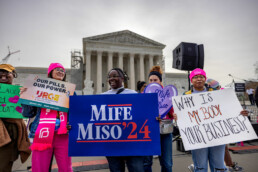


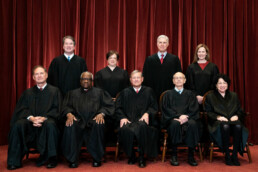


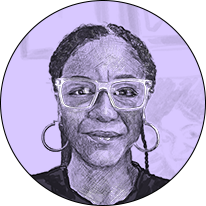 Rebecca Carroll is a writer, cultural critic, and podcast creator/host. Her writing has been published widely, and she is the author of several books, including her recent memoir, Surviving the White Gaze. Rebecca is Editor at Large for The Meteor.
Rebecca Carroll is a writer, cultural critic, and podcast creator/host. Her writing has been published widely, and she is the author of several books, including her recent memoir, Surviving the White Gaze. Rebecca is Editor at Large for The Meteor.